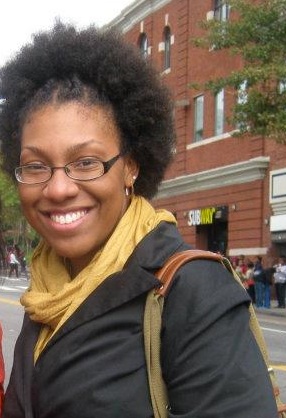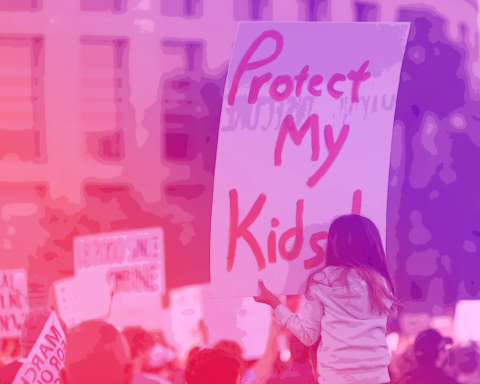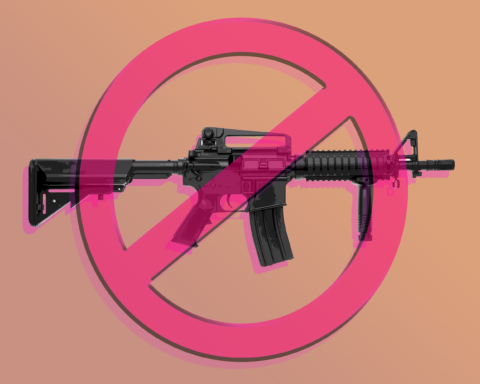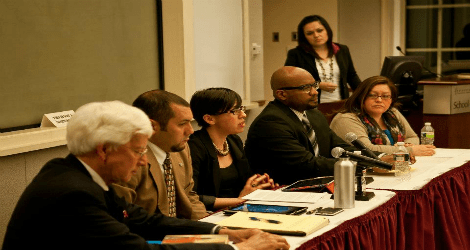Princeton Theological Seminary
Is social justice a priority for the church? Seminarian, Rachel Livingston, contends that social justice cannot be a priority when the church does not even know what it is. But the problem goes even deeper: many in the church do not value social justice, or even agree that it should be of some concern. Rachel challenges the church to expand beyond the comfort of its walls and to understand social justice as an essential calling of the community of Christ. She says that we must labor for justice even if we do not see dramatic change in our lifetimes.
By Rachel B. Livingston View and print as PDF.
View and print as PDF.

As I take a look around this world, I cannot help but see the injustices that surround me: children going to bed hungry, children not being properly educated, prisons becoming institutions that care more about making money off the prisoner than rehabilitating him/her to re-enter society. I cannot help but feel that God is calling God’s people to take a stand to advocate for and work to right these injustices. However, there are times I stand alone not only in this belief, but also in action. Then I begin to question whether God is really calling me to this ministry. The feeling of isolation and doubt can be quite overwhelming. But then I pray and turn to God. And I realize that I am not alone. As it was for Jesus when he prayed in the garden of Gethsemane by himself, God is with me. For it is God’s will that must be done on this mission and not mine.
I grew up in an African American independent Methodist church. That is the central axis of my experience: the African American church. But I believe that the issues encountered there extend, in varying degrees, to the wider church. I have found that people do not even know what social justice is, much less how to go about practicing it within the life of the church. Within my own congregation, there is a general understanding of social justice because of the teachings of our pastor. However, this is not the true for many churches. It is the task of those in ministry professions, and all who wish to serve the Lord, not only to teach the church what it means to be concerned with social justice, but also to teach them why it is important for the life of the church and its ministry to others. Until the church critically examines its understanding (or lack thereof) of social justice, I will continue to feel unsupported by national structures.
Yet, there is reason for hope. I personally know of several churches with projects that focus on various social justice issues around the world. It is their example that inspires me to believe that this deepening of understanding and commitment can take place, not only in isolated congregations, but also in and through denominational institutions.
What Is Social Justice, Anyway?
As a seminarian who anticipates going into ministry, I have been given the task to make social justice more than a program or the occasional liturgical Sunday; social justice must be instituted in the very structure of the ministry of the church, essential to everything it does. Social justice is not just something the church does; it is rooted in the fabric of its identity as a community. When the church no longer focuses on social justice it becomes irrelevant and stops being the church.
When I think of social justice, my vision lies in identifying the glaring social issues within the community such as gun violence, child advocacy, and education or lack thereof for inner-city youth, and addressing them head-on. These issues may be addressed through public policy, through research, or through community involvement.
I see social justice as the act of working towards the goal of bringing justice to community issues, but what makes it important within the life of the church? How do you convince those in the church that social justice is something that they should be concerned with? In my first sermon delivered in at my home church, Mother African Union Church in Wilmington, DE, I focused on the scripture verse Micah 6:8 which says that we are called to, “do justice, love mercy, and walk humbly with our God.” These three pillars are the foundation upon which God calls the church to do social justice.
The first command of this verse is to do justice, but what does that mean for us? It means God is calling us to do what is morally right toward and in the interest of our neighbor, but we have to remember that our neighbors are those right here within our communities as well as beyond.
God also calls us to love mercy. We should forgive and show people the love of God, meaning we must not reduce ourselves by yielding to hate and exclusion: we are called to heal the breach, not further it. We are moreover called to walk humbly with our God in close relationship, meaning our justice must not become self-righteousness, but rather should be found in the practice of listening and being obedient to God.
To execute social justice effectively, we as a church body must first take action to ensure that people are treated morally right, we must show others the love of God through our actions, and finally we must maintain relationship with God so that God can ultimately take control of the situation.
We Are in This Together
It is the last section of Micah 6:8, which commands us to walk humbly with God, that so often gets neglected, both in church and in social justice activism. Social justice is community oriented; it is about helping others. But the general message taught in society and often in church is that the individual self comes first. It’s a competitive world and I’m in it to get mine. That’s what we hear. Churches are better at masking the harshness of that statement, but it essentially remains the same in the contemporary emphasis on personal relationship with God. Focusing on the self is important, but often times it seems like the church teaches us to focus on what “I” can get from this relationship with God and how “I” can benefit. It is a faith for individual consumers.
However, relationship with God is more than that; God calls the church to be a body, meaning that we have to work together. Our personal relationship with God can only get stronger when we show love to one another and cultivate our collective relationship with God. This relationship with God is not only vertical, but it is also horizontal.
We in the church were not designed to function as isolated individual entities, each out to secure his or her own salvation, but to function as a body working together. If we think about the church as a body, then we have to concern ourselves with things that constantly affect the body of Christ, and when one part of the body is injured or sick we must do something to try to alleviate this problem. When I see the issues within my community of gun violence, poor education of children, lack of care for children, and many more issues, I cannot help but think that these are sicknesses within the body.
My home church, Mother African Union Church, started to work on the issues of gun violence in the community precisely because they recognized that gun violence affects everyone. When you have members, friends of members, and family of members in the body affected by gun violence, you clearly have a sickness that needs to be addressed in the body. Gun violence suddenly becomes personal. Apathy is no longer an option.
I challenge the church to take a stand for the health of the whole body of Christ.
As we take this stand, let us remember that justice often progresses slowly. People sometimes resist committing themselves to the protracted work of social justice because they do not want to raise their hopes only to have them dashed. They believe it is a waste of time because nothing will change: the powerful will remain in power and the poor will continue to starve. There is hope, but we must take the long view. I may not see a dramatic change right away; but there may be small changes that occur. Even Rev. Dr. Martin Luther King Jr., a pioneer for social justice, did not see race and class equality come to fruition. But that alone is not why we act. We act because it is right, because our brothers and sisters are hurting, because it is our calling.
______________________
Rachel Berena Livingston is currently a student at Princeton Theological Seminary where she is pursuing an MDiv expecting to graduate in 2014. She was licensed as the minister of social action at Mother African Union Church in July 2011. She grew up in Wilmington, DE, where she was very involved in the church. She eventually went to Howard University from where she received a B. S. in Mechanical Engineering in December of 2010. During her years at Howard University she began to surrender to the call of God and became passionate about social justice. She found this love by participating in Howard University’s Alternative Spring Break through which she traveled to New Orleans in 2007 to help in the efforts to clean up after Hurricane Katrina and also when she traveled to Chicago in 2009 to lobby for common sense gun laws with the Faith Community of St. Sabina. Through these experiences, Rachel has seen that God is calling her to be a voice that will speak out against injustices in today’s society with a specific interest in child advocacy and reducing violence in the community. A quote that she lives by is “Put your hand in the hand of God, that he might be much better than light and much safer than a known way.”





Unbound Social